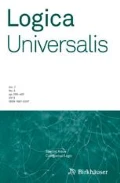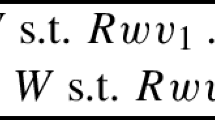Abstract
In this paper, a suitable notion of bisimulation is proposed for the bimodal logic with contingency and accident. We obtain several van Benthem Characterization Theorems, and axiomatize the bimodal logic over the class of Eulidean frames and over some more restricted classes, showing their strong completeness via a novel strategy, thereby answering two open questions raised in the literature. With the new bisimulation notion, we also correct an error in the expressivity results in the literature.
Similar content being viewed by others
Notes
In fact, [2] gives a complete axiomatization for strong noncontingency logic \({\mathcal {L}}(\blacktriangle )\) over the class of Euclidean frames, thereby answering an open question posed in [11]. However, since as shown in [11], \({\mathcal {L}}(\blacktriangle )\) is equally expressive as accident logic over the class of arbitrary models, thus one can translate the axiomatization of Euclidean strong noncontingency logic into an axiomatization of Euclidean accident logic.
It is worth remarking that the canonical relation is equivalent to the one given in the following way: \(sR^ct\) iff for all \(\varphi \), if \(\Delta (\varphi \vee \chi )\wedge \circ (\lnot \psi \rightarrow \varphi )\in s\) for all \(\psi \) and \(\chi \), then \(\varphi \in t\).
Here what it means for a bisimulation notion to be tailored for a logic consists in two respects: firstly, bisimilarity implies logical equivalence; secondly, on a certain class of saturated models, logical equivalence implies bisimilarity.
Note that now we do not need a translation from \({\mathcal {L}}(\nabla )\) to \({\mathcal {L}}(\nabla ,\bullet )\), because all formulas in \({\mathcal {L}}(\nabla )\) are obviously also formulas in \({\mathcal {L}}(\nabla ,\bullet )\).
The compactness of \({\mathcal {L}}(\nabla ,\bullet )\) follows from the strong completeness of the minimal logic of \({\mathcal {L}}(\nabla ,\bullet )\), for which we refer to [9].
Here the standard translation \(ST_x\) of an \({\mathcal {L}}(\nabla ,\bullet )\)-formula, where x is a first-order variable, is defined as follows:
$$\begin{aligned} \begin{array}{lll} ST_x(p)&{}=&{}Px\\ ST_x(\lnot \varphi )&{}=&{}\lnot ST_x(\varphi )\\ ST_x(\varphi \wedge \varphi )&{}=&{}ST_x(\varphi )\wedge ST_x(\psi )\\ ST_x(\nabla \varphi )&{}=&{}\exists y\exists z(xRy\wedge xRz\wedge ST_y(\varphi )\wedge \lnot ST_z(\varphi ))\\ ST_x(\bullet \varphi )&{}=&{}ST_x(\varphi )\wedge \exists y(xRy\wedge \lnot ST_y(\varphi ))\\ \end{array} \end{aligned}$$One may verify that every \({\mathcal {L}}(\nabla ,\bullet )\)-formula is equivalent to a first-order formula containing three variables, in contrast to only two variables in the case of standard modal logic \({\mathcal {L}}(\Diamond )\).
An alternative proof method is using the notion of ‘mirror reduction’ proposed in [9, Footnote. 5]. In detail, we can define the notion of mirror reduction of a model as follows: let \({\mathcal {M}}=\langle S,R,V \rangle \) be a model. Its mirror reduction \({\mathcal {M}}^m=\langle S,R^m,V \rangle \), where \(R\backslash \{(x,x)\mid R(x)=\{x\}\}\subseteq R^m\subseteq R\). [9, Prop. 10] has shown that \({\mathcal {M}}^m,s\vDash \varphi \) iff \({\mathcal {M}},s\vDash \varphi \) for all \(\varphi \in {\mathcal {L}}(\nabla ,\bullet )\). Then this proposition follows from the fact that \({\mathcal {M}}^c\) is the mirror reduction of \({\mathcal {M}}^+\). Similar remarks apply to Proposition 6.14.
\(\mathbf{K4^{\nabla \bullet }}\) is proposed in [9, Sec. 6.2], which is the smallest extension of \(\mathbf{K^{\nabla \bullet }}\) with the following axioms:
$$\begin{aligned} \begin{array}{ll} \text {A4-1} &{} \circ \Delta \varphi \\ \text {A4-2} &{} \bullet \psi _1\wedge \Delta \varphi \wedge \circ (\lnot \psi _1\rightarrow \varphi )\rightarrow \circ \circ (\lnot \psi _2\rightarrow \varphi ).\\ \end{array}\end{aligned}$$It is unknown whether axiom A4-1 is dispensable without affecting the completeness.
References
Ariew, R., Garber, D.: (Eds., and Trans.). G. W. Leibniz: Philosophical Essays. Indianapolis: Hackett Publishing Company (1989)
Balbiani, P., Fan, J.: A complete axiomatization of Euclidean strong non-contingency logic. In Proceedings of 12th Tbilisi Symposium of Language, Logic and Computation (TbiLLC), Lagodekhi, Georgia, pp. 43–48 (2017)
Béziau, J.-Y.: The power of the hexagon. Log. Univ. 6(1–2), 1–43 (2012)
Beziau, J.-Y.: Possibility, contingency and the hexagon of modalities. South Am. J. Logic 3, 273–290 (2017)
Blackburn, P., de Rijke, M., Venema, Y.: Modal Logic. Cambridge Tracts in Theoretical Computer Science, vol. 53. Cambridge University Press, Cambridge (2001)
Brogan, A.: Aristotle’s logic of statements about contingency. Mind 76(301), 49–61 (1967)
Cresswell, M.: Necessity and contingency. Stud. Logica. 47, 145–149 (1988)
Fan, J.: Logics of essence and accident (2015). arXiv preprint arXiv:1506.01872 (unpublished manuscript)
Fan, J.: Bimodal logics with contingency and accident. J. Philos. Log. 48(2), 425–445 (2019)
Fan, J.: A road to ultrafilter extensions. In: Liao, B., et al. (eds.) Dynamics, Uncertainty and Reasoning. Logic in Asia: Studia Logica Library, pp. 117–133. Springer, Singapore (2019). https://doi.org/10.1007/978-981-13-7791-4_6
Fan, J.: Strong noncontingency: on the modal logics of an operator expressively weaker than necessity. Notre Dame J. Formal Log. 60(3), 407–435 (2019)
Fan, J.: Symmetric contingency logic with unlimitedly many modalities. J. Philos. Log. 48(5), 851–866 (2019)
Fan, J., Wang, Y., van Ditmarsch, H.: Almost necessary. Adv. Modal Log. 10, 178–196 (2014)
Fan, J., Wang, Y., van Ditmarsch, H.: Contingency and knowing whether. Rev Symb. Log. 8(1), 75–107 (2015)
Fitch, F.B.: A logical analysis of some value concepts. J. Symb. Log. 28(2), 135–142 (1963)
Gilbert, D.R., Venturi, G.: Reflexive-insensitive modal logics. Rev. Symb. Log. 9(1), 167–180 (2016)
Heinemann, F.H.: Truths of reason and truths of fact. Philos. Rev. 57(5), 458–480 (1948)
Humberstone, L.: The logic of non-contingency. Notre Dame J. Formal Log. 36(2), 214–229 (1995)
Humberstone, L.: Zolin and Pizzi: Defining necessity from noncontingency. Erkenntnis 78, 1275–1302 (2013)
Kuhn, S.: Minimal non-contingency logic. Notre Dame J. Formal Log. 36(2), 230–234 (1995)
Marcos, J.: Logics of essence and accident. Bull. Sect. Log. 34(1), 43–56 (2005)
Montgomery, H., Routley, R.: Contingency and non-contingency bases for normal modal logics. Logique et Analyse 9, 318–328 (1966)
Moore, G.E.: A reply to my critics. In: Schilpp, P.A. (ed.) The Philosophy of G.E. Moore. The Library of Living Philosophers, vol. 4, pp. 535–677. Northwestern University, Evanston (1942)
Pascucci, M.: Two temporal logics of contingency. Austral. J. Log. 12(2), 121–134 (2015)
Pascucci, M.: Anderson’s restriction of deontic modalities to contingent propositions. Theoria 83(4), 440–470 (2017)
Pizzi, C.: Contingency logics and propositional quantifications. Manuscrito 22, 283–303 (1999)
Segerberg, K.: Classical Propositional Operators. Clarendon Press, Oxford (1982)
Steinsvold, C.: Completeness for various logics of essence and accident. Bull. Sect. Log. 37(2), 93–101 (2008)
Steinsvold, C.: A note on logics of ignorance and borders. Notre Dame J. Formal Log. 49(4), 385–392 (2008)
van der Hoek, W., Lomuscio, A.: A logic for ignorance. Electronic Notes Theor. Comput. Sci. 85(2), 117–133 (2004)
Zolin, E.: Completeness and definability in the logic of noncontingency. Notre Dame J. Formal Log. 40(4), 533–547 (1999)
Zolin, E.: Infinitary expressibility of necessity in terms of contingency. In: Proceedings of the Sixth ESSLLI Student Session, pp. 325–334 (2001)
Acknowledgements
This research is supported by the Project 17CZX053 of National Social Science Fundation of China.
Author information
Authors and Affiliations
Corresponding author
Additional information
Publisher's Note
Springer Nature remains neutral with regard to jurisdictional claims in published maps and institutional affiliations.
Rights and permissions
About this article
Cite this article
Fan, J. Bimodal Logic with Contingency and Accident: Bisimulation and Axiomatizations. Log. Univers. 15, 123–147 (2021). https://doi.org/10.1007/s11787-021-00270-9
Received:
Accepted:
Published:
Issue Date:
DOI: https://doi.org/10.1007/s11787-021-00270-9




